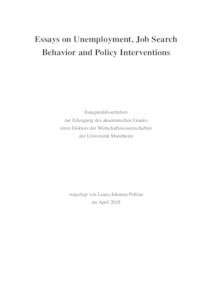|
Essays on unemployment, job search behavior and policy interventions
Pohlan, Laura
![[img]](https://madoc.bib.uni-mannheim.de/45665/1.hassmallThumbnailVersion/Dissertation_Pohlan.pdf)  Vorschau |
|
PDF
Dissertation_Pohlan.pdf
- Veröffentlichte Version
Download (7MB)
|
|
URL:
|
https://madoc.bib.uni-mannheim.de/45665
|
|
URN:
|
urn:nbn:de:bsz:180-madoc-456651
|
|
Dokumenttyp:
|
Dissertation
|
|
Erscheinungsjahr:
|
2018
|
|
Ort der Veröffentlichung:
|
Mannheim
|
|
Hochschule:
|
Universität Mannheim
|
|
Gutachter:
|
Berg, Gerard J. van den
|
|
Datum der mündl. Prüfung:
|
5 Juli 2018
|
|
Sprache der Veröffentlichung:
|
Englisch
|
|
Einrichtung:
|
Außerfakultäre Einrichtungen > GESS - CDSE (VWL)
Fakultät für Rechtswissenschaft und Volkswirtschaftslehre > Alexander v. Humboldt Professor in Econometrics and Empirical Economics (van den Berg 2009-2016)
Sonstige Einrichtungen > ZEW - Leibniz-Zentrum für Europäische Wirtschaftsforschung
|
|
Fachgebiet:
|
330 Wirtschaft
|
|
Normierte Schlagwörter (SWD):
|
Arbeitsmarkt, Arbeitslosigkeit, Evaluation, Kausalität
|
|
Freie Schlagwörter (Englisch):
|
Labor economics, Unemployment, Social Exclusion, Policy Interventions, Minimum Wage, Internet
|
|
Abstract:
|
This dissertation explores through which channels unemployment leads to exclusion from society and how policy interventions and technological innovations affect individual job search behavior and are able to bring unemployed persons back into the labor market. All four chapters contained in this dissertation are based on large individual-level data sets from Germany and aim at identifying causal relationships by employing different empirical methods. This thesis starts in the first chapter with an analysis of how job loss impacts different dimensions of social exclusion and shows that unemployment has detrimental economic and social effects. In the second chapter, which is co-authored by Annette Bergemann and Arne Uhlendorff, we study employment effects of participation in job creation schemes in the years after German reunification. We find that participation in job creation programs is beneficial for high skilled women in times of economic instability. In the third chapter, my co-authors Maximilian Blömer, Nicole Gürtzgen, Holger Stichnoth, Gerard van den Berg and I estimate an equilibrium job search model and simulate the introduction of different minimum wage levels. The results indicate that minimum wage effects on unemployment are non-linear and highly dependent on the labor market structure. In the last chapter, which is co-authored by Nicole Gürtzgen, André Nolte and Gerard van den Berg, we find that high-speed internet leads to higher reemployment probabilities with a certain time delay. This effect is particularly pronounced for unemployed males.
|
 | Dieser Eintrag ist Teil der Universitätsbibliographie. |
 | Das Dokument wird vom Publikationsserver der Universitätsbibliothek Mannheim bereitgestellt. |
 Suche Autoren in Suche Autoren in
Sie haben einen Fehler gefunden? Teilen Sie uns Ihren Korrekturwunsch bitte hier mit: E-Mail
Actions (login required)
 |
Eintrag anzeigen |
|
|
